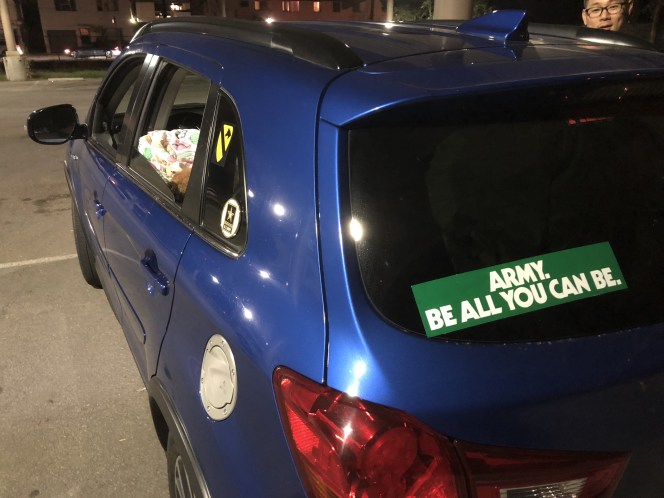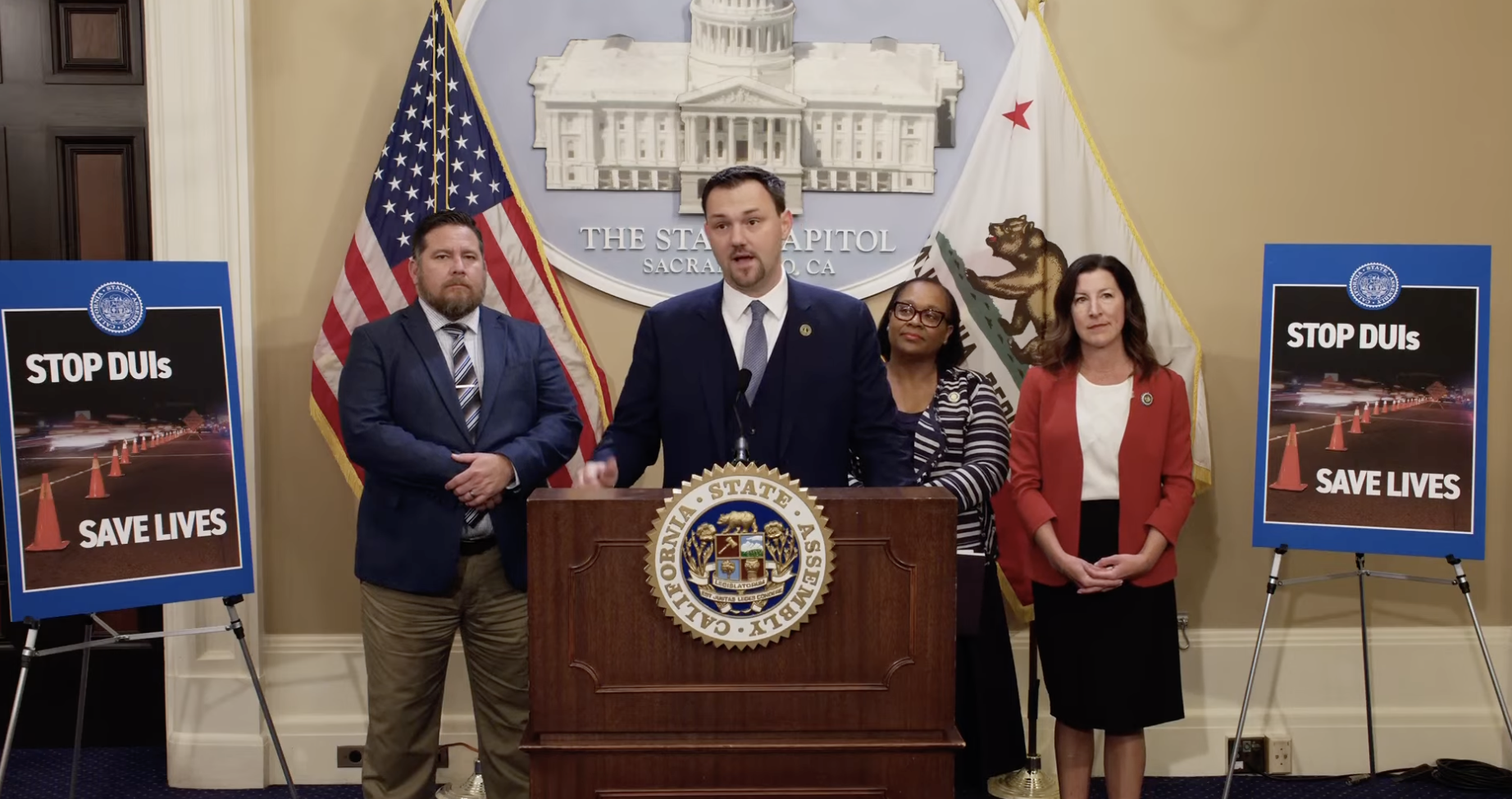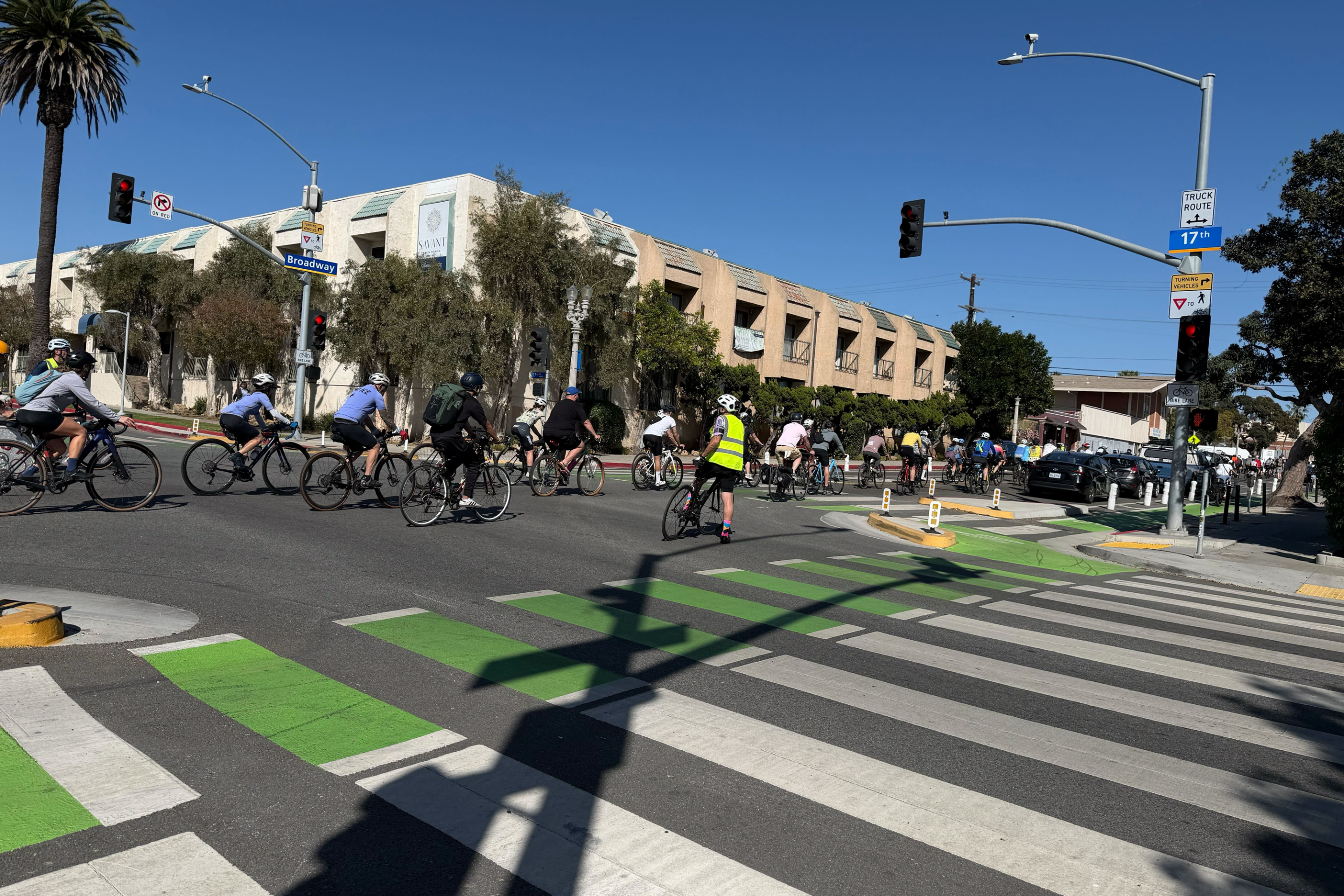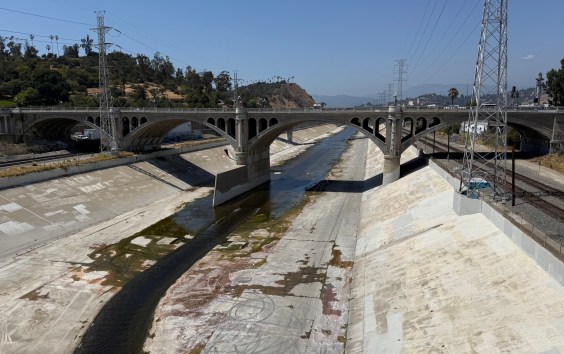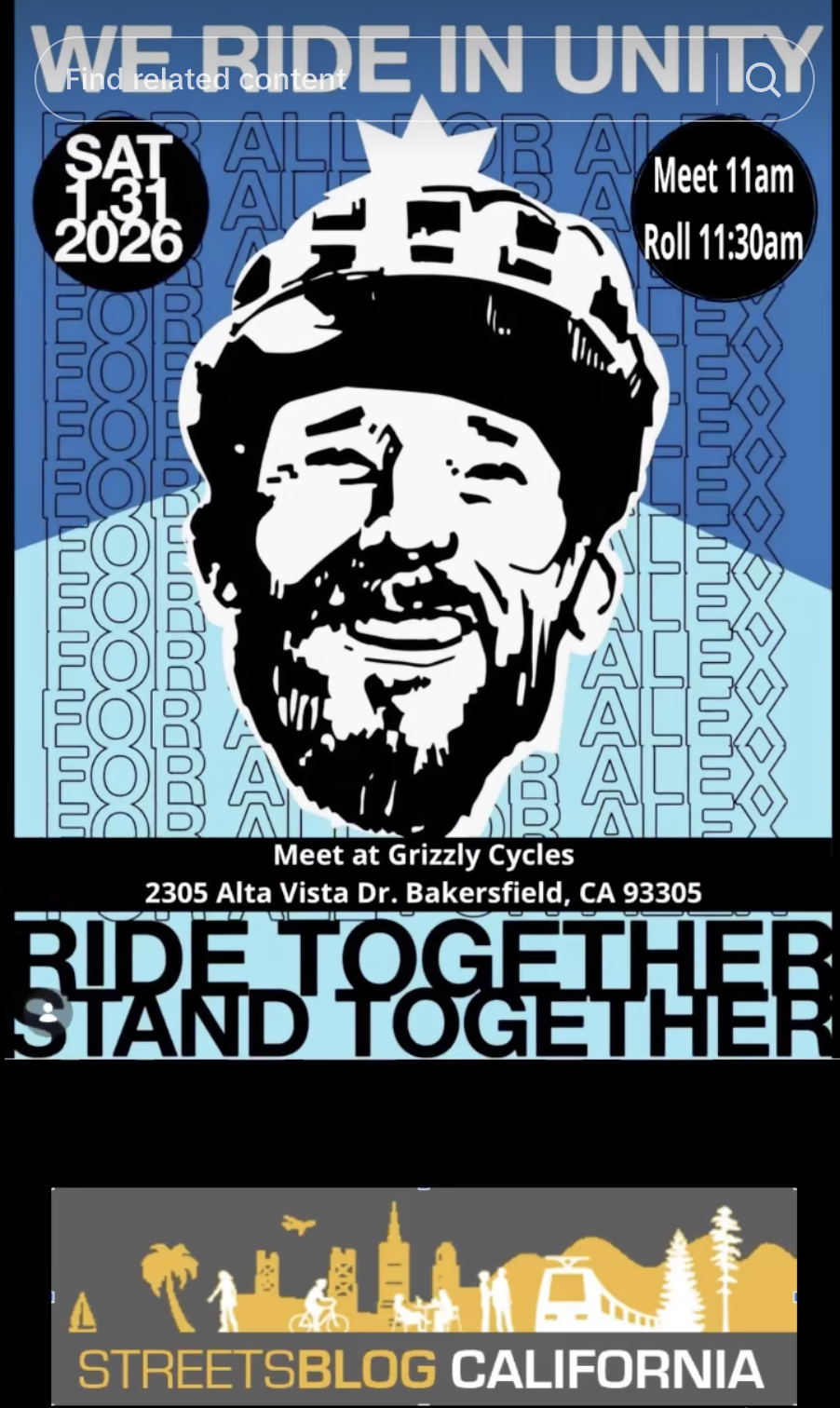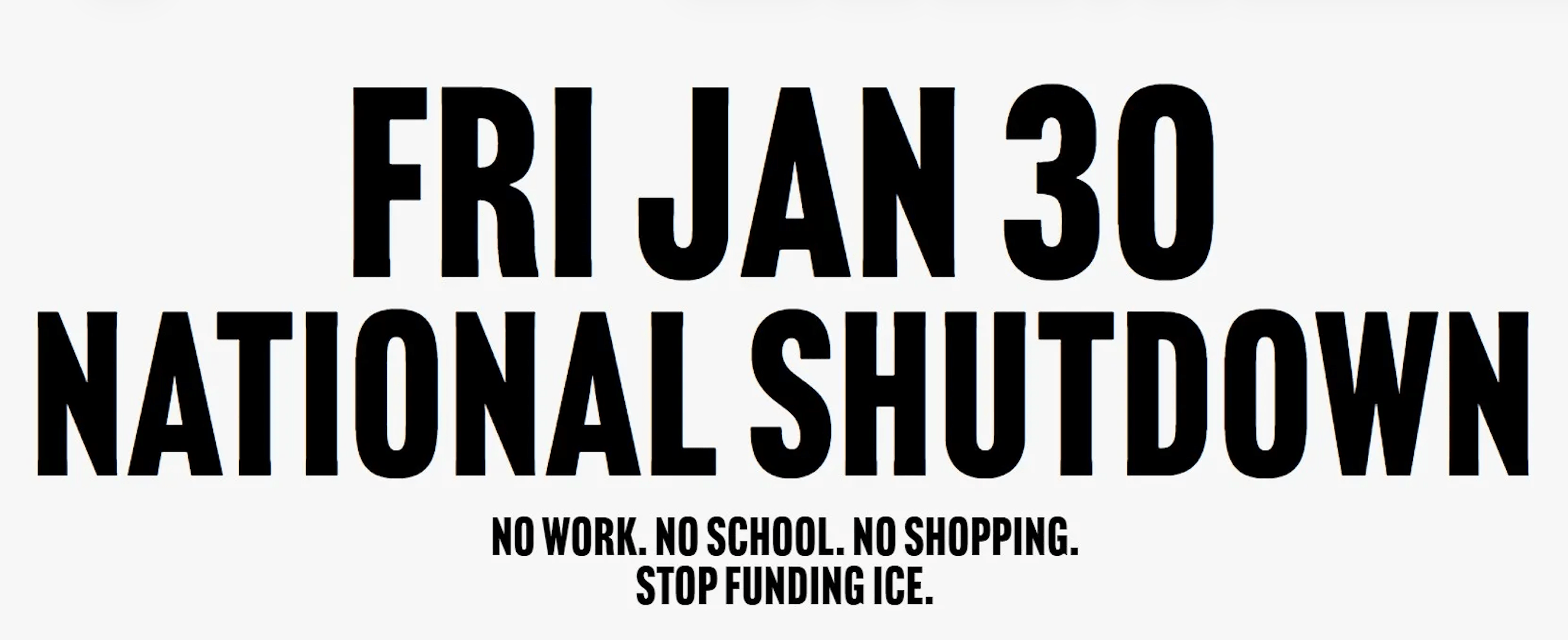Earlier this month, the Veteran's Administration West Los Angeles Medical Center (the VA) moved its Safe Park facility to a new, larger, lot on the campus. The new, larger, lot allows more veterans to take part in the program that provides homeless veterans living in their vehicles a safe place to park, eat, sleep and share stories with others who have shared some of their life experiences.
In a recent Streetsblog story, we profiled the Safe Park program - a non-profit led effort to provide overnight parking spaces for the more than 8,000 homeless Angelenos who sleep in a car. As readers will see, Safe Park's programs go well beyond just a parking spot.
Last week, I visited the new Safe Park lot at the VA, and met some program participants and social workers helping participants make the next steps in their lives.
When I arrived at the lot last week, I was vetted by a security guard and met by Ira and Pat Cohen, the retired couple who form two-thirds of Safe Park's Board of Directors. The VA lot is special to them, and they visit it often. Chanin Santini, a Veteran Care Coordinator with the VA, also provided introductions and explained to me how the VA interacts with veterans in Safe Park and how their goal is more than providing a safe place to park, sleep and rest.
"Because this program is nighttime hours, there's not a lot I can do for them without them following up with me. So we're out here, two nights a week, talking to them about more than just housing," Santini explained. "So people get back to me during the day, and I can follow-up with referrals. As best we can, we can get them the help they need."
Safe Park has to be about more than just a program that provides a place to sleep at night. The goal is not to create a permanent place to sleep on the street, but a safe way for people to begin working towards permanent housing.
"The program can't be about making sleeping in cars a permanent solution, we're happy to help provide a safe, protected lot. Happy to provide a place for Meals on Wheels to drop off food. But we have to be more than that," said Santini. She is proud of the successes Safe Park has had: at least a half a dozen veterans have found affordable housing in the past couple of months thanks to the program. Santini acknowledges that not every story ends that way.
Last week, I met a native Angeleno that had returned looking for work, a disabled veteran looking forward to reunification with his son, and a man taking part in the program for the last time, before leaving for his home in El Paso, TX the next morning.
Every interview I completed with a participant in the program was light, informal and had a certain amount of humor in it. One man, teased me about riding my bicycle to the lot. The military veteran still suffering from a wound joked about the bravery it takes to bike in L.A. Another gently teased Santini about her name (her first name "Chanin" is pronounced the same as "Shannon") and repeatedly asked her to spell it mimicking the tone of voice I used when I asked interviewees to spell their names.
I was repeatedly put at ease by how conversational everyone was sharing their life stories.
Andre Sanchez arrived in Los Angeles months ago for his sister's funeral, and found himself without the means to return when his trip took longer than anticipated. His story is one of the easier success stories, as the only help he needed was a way home. After a couple of weeks of parking at the VA, Safe Park was able to provide direct support: new tires, gas and a hotel stipend.
"A bed," he laughed when I asked what was waiting for him in El Paso. "A bed. A roof... I haven't spent more than a couple of minutes on my back in months."
While he appreciates Safe Park, he never once considered the program a permanent solution. During our talk, he emphasized the amount of time between chances for "just getting to lie down," and some of the health issues this lack of rest has caused his body.
While writing this story, I contacted Sanchez again. Happily, he was already well on his way, enjoying a pit stop at his aunt's in Tuscon for a week. Without me asking, he sent along a picture of today's Arizona Republic to show the progress he's made. Before he left Los Angeles last week, he visited family members. He had just returned from visiting his niece for a couple of days, relieved for the time he was able to spend lying down on his back. Now he's taking time to see other relatives on his trip home.
He has no doubt that his life would be very different without Safe Park and the Cohens.
"Angels," he corrects when I comment that the Cohens are described to me by people as a mix between super heroes and saints. "They're angels. They had no reason, no personal reason, to set this up. They had no reason to come out and visit and talk to me... to everyone. They didn't have to help fix my car and get me new tires. But they did. And now I get to go home."
But other problems are more complicated. Carlos Gonzalez has lived in his RV on the streets of Los Angeles for years. While Safe Parking has provided a safer life, he says he's comfortable in his RV since April when he enrolled in the Safe Park program at the VA. Lying on his back, to relieve pressure on his legs that will never recover from the injury he sustained defending our country, Gonzalez talks to anyone who wanders by his window. Wearing a Dodgers t-shirt and a smile, he is a fierce believer in both Safe Park and the VA.
"It's a great program. It's changed my life," Gonzalez explained. "They have food, real food, sometimes even hot food. The social workers are great. They come to you. They help."
For Gonzalez, what he wants most in life is reunification with his family. At least for now, his goal is not life outside the RV, but it's time with his son. While we're chatting, Santini comes over with the news. The VA is going to allow his son to stay with him in their lot in Gonzalz' RV. This change means everything to Gonzalez.
What does this news mean to Gonzalez? Simply put, "everything."
Last week's visit also gave me a chance to visit with a family who had just entered the program. Abraham, in his early sixties, chatted with me outside his car while his wife filled out VA paperwork and his daughter rested inside. An L.A. native, Abraham recently arrived back in his hometown seeking work.
"Los Angeles is not an easy place to make it. It wasn't fifty years ago. It's not now," Abraham opined. A second generation veteran, Abraham is horrified by the conditions he found in Los Angeles which he described as a "vacation into homeless hell."
"When I was a little kid, my dad... my parents went through some hard times and the Salvation Army pulled us through. Now today, you see all this homeless stuff going on. It's sad. It's pathetic. Our country can't do more for our people living in tents."
In a sign of the times, Abraham found the safe parking program by literally Googling "safe places to park." Without the VA, he worried he would be so far from the job centers that he would waste money on gas that he wants to use to save money for housing.
Because he is living with adult members of his family, Abraham is not allowed into the housing facilities on the VA campus. But there are other programs, oversubscribed as they are, for veterans that Santini and the VA can help them get into.
"It's promising," said Abraham of their efforts. "The key is surviving long enough to get into the program."
For the dozen or so veterans huddled into the lot during my visit, Safe Park's goal is to help everyone survive long enough get there.
